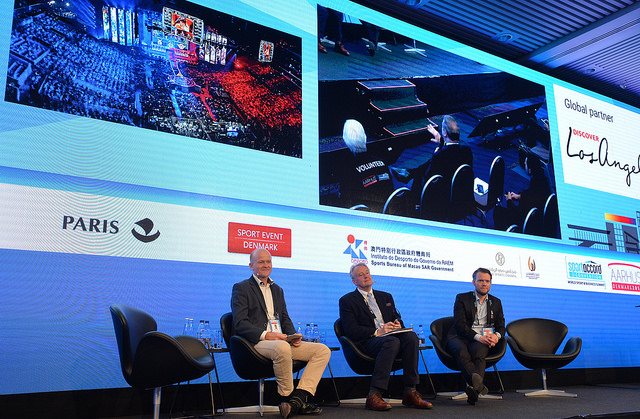The annual conference LawAccord took place on the third day 2017-04-06 of SportAccord convention. LawAccord provides insight on the legal business of sport.
Matthieu Reeb, Secretary General of CAS, Court of Arbitration for Sport, presented the most recent jurisprudence and CAS rules in the last year. Most notable was the case of C.Pechstein v/ ISU, International Skating Union, The Russian cases and the Olympic Games Rio 2016. There has been an increase of CAS procedures in 2017. Out of the 2750 CAS awards, there was 166 appeals, where only 10 were successful.
Dr Reiner Martens followed with a commentary and some insight on the Claudia Pechstein decision. Questions raised on the background of the Pechstein-case, involves the neutrality of CAS, the question of ”forced” arbitration and doubts on the system of the appointment of chairperson in doping cases.
Julien Sievking, Director, Legal Affairs from WADA, World Anti-Doping Agency, provided an update on the implementations of the 2015 Code, the WADA compliance program, as well as a roundup of the latest WADA investigations. The 2015 Code was a reaction to the Pound and McLaren Investigations on the state-run doping program in Russia and sample swapping at the Sochi laboratory. It was proved that WADA’s investigations and intelligence-gathering capability needed to be enhanced. To prevent a case of this scope again, WADA introduced the Whistle-blower Program ”Speak Up”. ”Speak Up” was launched in 2017 and includes an online platform and mobile application through which misconduct can be reported, the policy and procedure for reporting misconduct, the Whistle-blower agreement and Confidence and security.
The conference ended with an update on the important changes to the CAS Ad Hoc Doping Rules for Pyeongchang 2018 and the IOC, International Olympic Committee, Anti-Doping Rules. In light of these changes, CAS are considering to create a permanent CAS Doping Division, which would be composed of arbitrators who would be part of a special CAS list and would not be eligible to sit on appeal cases for doping.
Aside from this, the conference held a workshop on Esport that asked what legal strategies that are used to regulate the community. Jakob Larsen, Director, Danish Athletic Federation, Christian Sorensen, Head of Customer Experience, F.C. Kobenhavn and Stephen Townley, CAS Arbitrator and Mediator, LawAccord Chair, touched upon some of the issues of Esport including verbal abuse, drug-use, how to regulate the sport and hacking. Esport has become a highly competitive sport played by professionals’ recent years sparking the interest of professional sport firms and creating the need for a new set of regulations. Whether Esport is a competition, a game or a sport was also leaving room for discussion. Esport have learned from the organisation of sport, so maybe it’s time for sport to learn from the growing popularity of virtual gaming.
